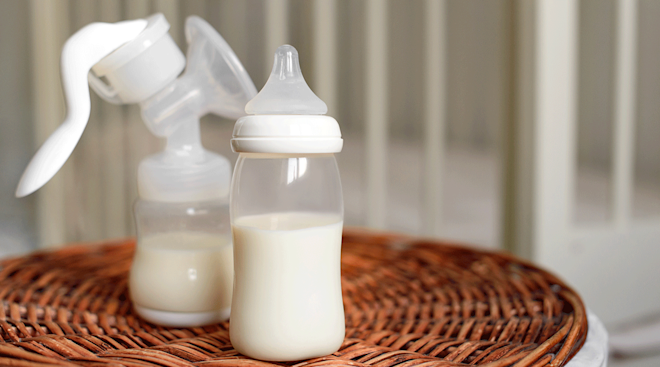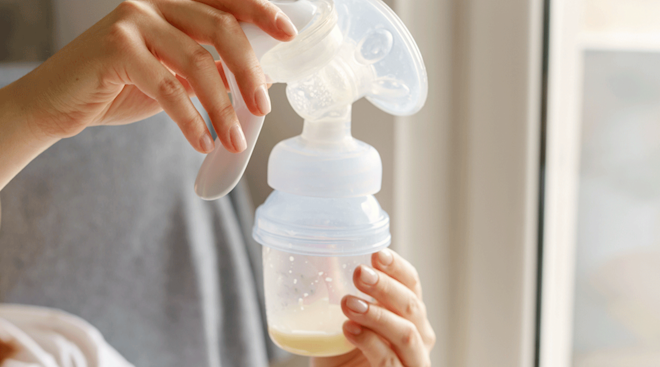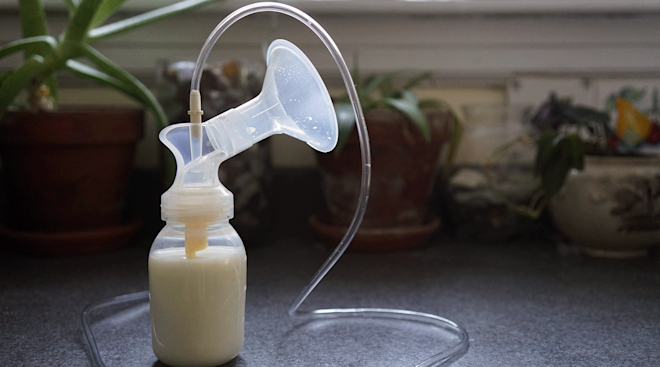This Genetic Mutation May Explain Why Some Women Struggle to Breastfeed
The World Health Organized, American Academy of Pediatrics and the American College of Obstetricians and Gynecologists all recommend new moms exclusively breastfeed until baby is six months old, as this helps give baby the nutrition they need and boosts their immune system.
However, not every mom is able to do this—and it could be for a myriad of reasons including a lack of supply, pain, it doesn’t work with her schedule or she simply doesn’t want to. While all of these are legitimate reasons to stop breastfeeding, one study is finding that, for women who have an inadequate milk supply, a genetic mutation may be to blame.
The study was conducted by Penn State College of Medicine and published in Breastfeeding Medicine. It looked at perceived inadequate milk supply (PIMS), which is a condition in which women stop breastfeeding because their supply wasn’t enough. The researchers looked at 88 women between 19 and 42 years old over the course of the first year of their child’s life. The moms also answered surveys on baby’s feeding habits at one, 4, 6 and 12 months old, including questions on perceived milk supply, as well as whether baby’s diet was supplemented with formula and why. Many women stated the following reasons for supplementing with formula: low milk production, signs of allergic reactions to breast milk, work schedules, day care or other time constraints.
The researchers also collected DNA samples in the form of saliva from the mothers. They analyzed 18 genes that frequently occurred in milk-producing tissue in women, looking for mutations within them to find if there was an association with PIMS. While they found 10 modifications in the genes, there was one variant found more frequently in women who suffered from PIMS. While age, previous breastfeeding experience and body mass index did not play as big a role in determining PIMS or PAMS (percieved adequate milk supply), the researchers found this mutation did. According to the study, screening for this mutation, in combination with other factors like age and body mass index, could be helpful in identifying the moms at risk for stopping breastfeeding early due to inadequate supply.
According to Dr. Steven Hicks, lead researcher and pediatrician at Penn State Health Children’s Hospital, 83 percent of women start breastfeeding, but only 57 percent continue until their child is 6 months old. “Socioeconomic and environmental factors may contribute to early cessation, but milk supply is also an often-cited reason. Identifying women who are more likely to have low milk supply could help get them resources to continue breastfeeding such as lactation consultation services,” he said in a press release. “Identifying risk of PIMS at the outset of breastfeeding could provide opportunities for early, targeted interventions.”
While more research is needed and the findings need to be proven with a larger sample size, Hicks is hopeful this work will help new mothers meet their breastfeeding goals. “Moms with this mutation still produce milk, even if it may be less than women without the mutation, but challenges like poor diet, hydration or sleep could be enough to hinder the supply that they do have,” he said. “Screening for this variant and combining that with maternal reports and characteristics could help identify moms and babies that may need additional support.”
Navigate forward to interact with the calendar and select a date. Press the question mark key to get the keyboard shortcuts for changing dates.





















































